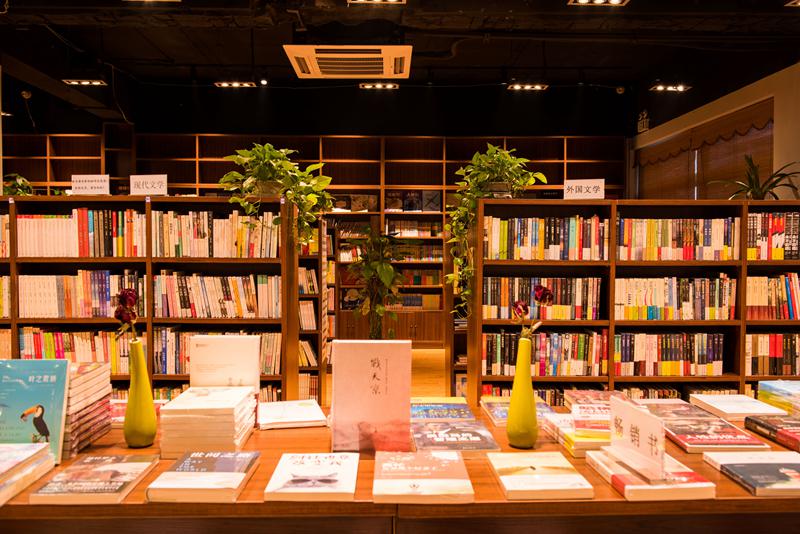Zhang Jiaming, a Chinese official released a report about the reading habits of people from all walks of life of our society. "More people choose to enjoy themselves in the foot bath shop instead of entering the bookshop. The owners of bookshops could hardly make money. The current reading situation in China is worrying. People prefer to sit on a soft leather sofa, enjoy the foot massage and slowly open a push from a news APP."
The report has attracted the attention of Brother Fu who lives in a city in Zhejiang Province. Born after 1980s, Fu agrees with the ideas of the report. He also talked much about the reading habits of Chinese Christians.
"Nowadays few Christians have a good habit of reading. They may receive fragmental information from WeChat every day. After buying books they usually store them on the bookshelf and decorate their study with those books which they may have never read thoroughly.
When the publishers recommend a good book, few people would have the driving force to read it. Brothers and sisters seldom talk about books. They are afraid that others would find their loose reading attitude. "In this age, people are eager for deep thoughts and inner peace. Reading may be the best way. However, few of them have realized it." Brother Fu said.
His sharing and exclamation also attracted a lot of Christians' comments and responses. "I remember an article which I read several years ago. According to the article, the reading habit of Chinese is very poor. A Chinese read less than one book every year on average. However, a Japanese read more than 10 books every year.
"Everyone is like a screw in this commercial society. We seldom have large sections of time for continuous reading. We could only take advantage of the intermittent leisure time for reading. We read on the subway and bus."
A few days ago, Christian Times invited Brother Fu to share his analysis of this topic. His ideas are as follows.
Currently, the reading level of Chinese Christians is generally low.
Brother Fu said that his conclusion was from his communication with young Christians in different regions. They talk about the reading habits of Chinese Christians online or through Wechat. They haven't done any rigorous questionnaire survey or conduct any data analysis but they are sure that most of Chinese Christians especially post-90s and post-00s generation lack high-quality reading. The situation of those in their 40s is not optimistic, either.
The situation faced with Christian publishing institution is contradict.
Brother Fu said: "The Christian publishing institutions in China often recommend good books. However, they are not able to arouse people's love of reading." He analyzed the status of China's Christian publishing institutions from two aspects.
On the one hand, some well-known public WeChat accounts such as Oak text studio have both rich resources and open vision. They have the ability to pick, translate and promote classical books. What matters most is that they could publish their works in the name of well-known domestic publishing institutions including Shanghai Joint Publishing Company.
On the whole, domestic publishers have published a lot of Christian books. For example, Dr. Henry Cloud's books Changes That Heal and It's Not My Fault were published by different domestic publishing companies. The Pilgrim's Progress and other Louis's books were reprinted.
Brother Fu thinks that many publishers recognize the cultural and historical value of Christianity. They have also seen its social and cultural effects. They are willing to publish high-quality Christian books such as the famous "Light And Sault" series in previous years. He also listed a number of relatively small publishers which focus on author's scholar status. For example, SINO-CULTURE PRESS published Different Blessing, the book of Zhuang Zukun.
On the other hand, Brother Fu mentioned that the impact of China's national policy and political environment restrict the development of Christians' reading habits. However, the fatigue in reading mostly relies on Christians themselves. He argues that the Christian WeChat public accounts and publishers have done professionally in attracting readers. They have good performance in promoting books, expanding the marketing and advertising books. They need to do their best to mobilize readers because they seek commercial benefits.
Meanwhile, some Christian institutions and WeChat public are established in accordance with the vision and mission of the Bible. They are aimed to encourage more Christians to read more Christian classics. However, the effects of their promotion still depend on the behavior of Christians. We should buy those good books and read them carefully.
Six bad reading habits of Chinese Christians
Brother Fu put forward six bad reading habits of Chinese Christians which show their fatigue in reading:
1. Some Christians may buy many books just for decoration. They seldom read those books.
2. Put away the cup after taking a tiny sip. Some Christians just read a book in order to find a reference or a sentence. Few of them would read a book from the beginning to the end.
3. False Respect. (There was once a man, Lord Ye, of ancient times who was very fond of dragons adorned his whole palace -- beams, pillars, doors, windows and walls -- with drawings and carvings of them. When a real dragon in heaven heard of this it was deeply moved by his infatuation and paid him a visit. When this man saw the real dragon thrusting in its head through the window of his study and its tail moving in his palace, he was frightened out of the house for his life. Clearly, what Lord Ye loved was not the real dragons.)
That is to say that some Christians don't really love reading. They just follow the trend. They read books maybe just because they think they are important. Sometimes they read books in order to brag about their life quality and elegant taste. They want to have the same topic with other people.
"For example, when a book is often mentioned in the church or the fellowship, many believers will buy it without reading."
4. Utilitarian Reading. We often find that some believers seek benefits in books. They may read books just to solve the specific problems in their life. They may even search for reference and counseling in Christian books. Marriage counseling books, reference books, and psychological counseling books are well sold. Some Christians would read those spiritual books with contents like fast food in order to remedy their irregular, unsystematic and pale daily spiritual life.
5. Over-emphasizing the Bible. Many brothers and sisters think that reading the Bible is fundamental. In their opinion, other spiritual books only contain primary and secular knowledge. Brother Fu said that this is a kind of anti-intellectual performance.
6. They don't have real reading interest and habits.
"The whole nation has the problem. We do not love reading or attach importance to reading. We lack the tradition and habit of reading. Our reading culture is full of utilitarianism. We cannot get down and bury ourselves in reading. The interest of reading has become a luxury. "Brother Fu said.
However, Brother Fu also affirmed that there are many Christian readers in the church who have cultivated the interest and habit of reading from Sunday school and university fellowships. They are able to read systematically.
The efforts made by Chinese Churches to encourage believers to read
"The pastors in the urban church always encourage believers to read more. The fellowships made up of post-90s and post-80s generation often recommend works of famous pastors at home and abroad. Books written by important figures in the history of Christianity are also recommended.
Brother Fu mentioned that he used to visit some rural churches. Pastors standing on the podium will encourage believers to read the Bible more often. The rural churches in Zhejiang Province pay more attention to reading. Their leaders look far ahead. They set up youth ministries. They also carry out children's ministries in Sunday school with special textbooks. They give out learning materials and recommend good books from time to time. They also encourage old pastors to read sermons and listen to the gospel more often.
Translated by Emma Ma













